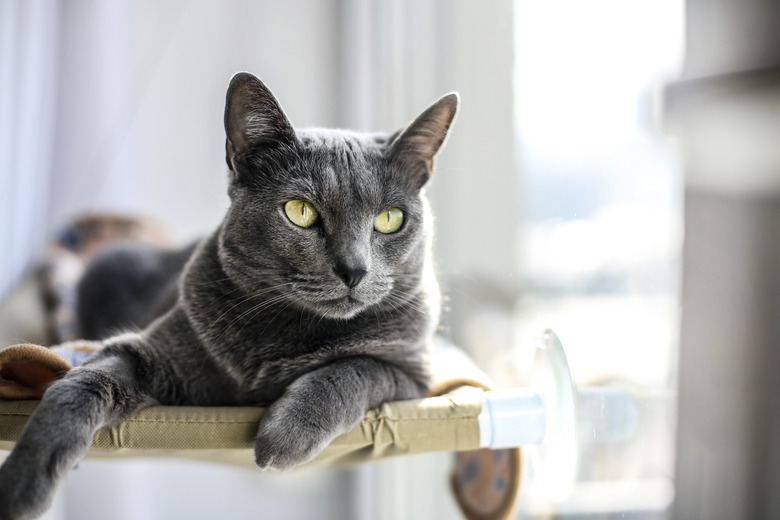Russian Blue Cats & Allergies
Those who own cats know just how lovable and fun they can be, but for those with allergies to them, owning a cat just isn't an option. Fortunately, silver-coated Russian blue cats might just be the felines for those with cat allergies because they are less likely to trigger allergic reactions.
While no cat is fully hypoallergenic, the Russian blue is pretty close. That's because these cats shed less and produce saliva with fewer allergens in it. Discover why Russian blue cats might just be the solution for those with allergies who are looking to adopt.
What causes allergies to cats?
What causes allergies to cats?
All cats, including Russian blue cats, produce a protein known as Fel d 1 in their fur, skin, saliva, and urine. This is the main trigger of allergies in people who are allergic to cats. If someone who is allergic to cats comes in contact with a cat, his fur, or his dander, the person will experience some form of an allergic reaction, including itchy and watery eyes, trouble breathing, sneezing, or a rash at the site of contact.
While cats produce a number of other proteins that can potentially trigger someone with an allergy, the main culprit is Fel d 1. If you are unsure of whether or not you are allergic to cats, see an allergy specialist who can perform tests to determine if Fel d 1 is the cause.
Are Russian blues hypoallergenic cats?
Are Russian blues hypoallergenic cats?
While no cats are truly hypoallergenic, Russian blue cats are considered less of an allergy risk than other cats. That's because the body of Russian blues produces less of the protein Fel d 1.
When your cat cleans herself with her tongue, she deposits her saliva on her coat, which is then transferred into the environment and becomes airborne. So, while your Russian blue may still trigger an allergic attack in those who are very sensitive to Fel d 1, because this breed produces less of the potential allergen, Russian blues are considered to be as close to hypoallergenic as possible. This is especially good for those who suffer from only mild allergies to cats.
Do Russian blue cats shed?
Do Russian blue cats shed?
Like any other cat breed, Russian blue cats do shed their fur, but they shed less than other breeds. This is another reason they are good for people with allergies. When their fur doesn't shed as much within the home, an allergic person is less likely to have a reaction to it.
These thickly coated cats tend to shed only minimally throughout the year except for in the spring and fall. All Russian blues have a thick double coat that is densely packed with multiple layers of fur. It feels silky to the touch and will shed but primarily twice a year when the seasons change. So, most owners don't have to deal with cat fur covering their clothing all the time.
Tips for those with cat allergies
Tips for those with cat allergies
If you suffer from cat allergies but still want to own a cat, a Russian blue may be a good match. To reduce the potential for an allergic reaction, adopt a female whose body produces less Fel d 1 than a male, or have your male Russian blue neutered, which reduces the amount of Fel d 1 his body produces.
Most importantly, brush your cat once a day to keep shedding to a minimum. You can also use premoistened pet wipes on your cat's coat a few times a week to remove any Fel d 1 residue from your cat's saliva and sebaceous glands.
In addition, ask your vet about a special diet cat food that will help reduce the amount of Fel d 1 your cat's body produces. You may also consider adopting a hairless sphynx, who won't shed. Other options are a Balinese or a Siberian; both are breeds that don't produce as much Fel d 1.
References
- Allergy, Asthma & Clinical Immunology: An Update on Molecular Cat Allergens: Fel d 1 and What Else? Chapter 1: Fel d 1, the Major Cat Allergen
- London Allergy & Immunology Centre: Pet Allergies: Do I Have a Cat Allergy?
- Hill's Pet Nutrition: Russian Blue Cat Information and Personality Traits
- Pet Educate: Do Russian Blue Cats Shed? [Is This A Hypoallergenic Breed?]
- ASPCA Pet Health Insurance: Fun Facts About Russian Blue Cats
- Purina Pro Plan: What Is Fel d 1?
